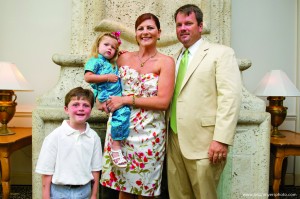
Nellie King ’92, shown here with husband Carl Schaefer, son George, and daughter Virginia, was sworn in as president of the Florida Association of Criminal Defense Lawyers this summer. King holds the volunteer position, equivalent in demands to a full-time job, along with her career as a defense lawyer. She is driven to protect the rights of the accused, a passion nurtured on the Mary Washington Honor Council.
As a member of the Mary Washington Honor Council for four years, Nellie King ’92 heard allegations of cheating, theft, and academic misconduct.
These days, her cases are more likely to involve allegations of drunk driving, rape, and even murder.
But King, a defense lawyer for 15 years, said her early experience at UMW primed her for the high-profile work she does now.
“What I experienced at Mary Washington was an environment that allowed me to ask questions and to challenge situations, and that was a natural transition for me to go to law school,” said King, a married mother of two who lives in Palm Beach County, Fla. “I’ve been asking questions and filing motions – much to the chagrin of prosecutors in my state – ever since.”
King recently was elected president of the nonprofit Florida Association of Criminal Defense Lawyers. The FACDL provides continuing legal education and professional networking for its 2,000 members, champions the constitutional rights of criminal defendants, and lobbies heavily against political efforts to step on the toes of an independent judiciary.
King had already served as the organization’s secretary, treasurer, and vice president, said Ian Goldstein, a West Palm Beach defense attorney who’s known her for at least a decade.
“She’s always at the forefront. When they ask for volunteers, she’s always one of the ones with her hand raised,” Goldstein said. “It’s a small fraternity of individuals who are able to and willing to put in the time and commitment it takes to become president. It’s a fulltime, unpaid job.”
King’s goals for the next year are ambitious. The process for Florida’s death penalty is flawed, she said, so the FACDL supports a review of it. The organization wants to revamp the state’s misdemeanor courts, which have become “conviction mills,” King said, sending scores of people to jail for minor offenses and subjecting them to potential loss of employment, deportation, and license restrictions.
The FACDL also supports Florida’s Innocence Commission, which tries to eliminate the causes of wrongful convictions.
“They are walking people out of jail after 30 years and giving them a slap on the back and a bus ticket and saying, ‘I’m sorry,’ ” she said. “You can’t give that man back the 30 years you took from him.”
Some violent offenders deserve to go to prison, she said. But some suffer from learning disabilities, mental problems, substance abuse, and other problems that, if addressed, would diminish the need for what she calls “the prison industrial complex.”
King, who majored in international relations and now serves on the Mary Washington Alumni Association Board, originally considered becoming a prosecutor. But participating in the school’s Honor Court – she was president her junior and senior years – convinced her that safeguarding the rights of the accused was her true calling.
“In our Constitution, it talks about the need for due process. Honor Court, watching how it unfolded, I observed the fact that these were allegations. The students coming before the board were alleged to have done something – but that’s not proof positive,” said King, who earned a J.D. at Nova Southeastern University law school in South Florida.
Sometimes people ask her how she can defend those accused of heinous crimes. Someone, she said, has to make sure that the state doesn’t trample on individuals’ constitutional rights.
“I wanted to be the voice of the underdog,” said King, a staunch defender of the Fourth Amendment right against unreasonable search and seizure. “There’s honor and dignity in what defense lawyers do.”
